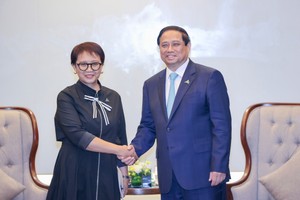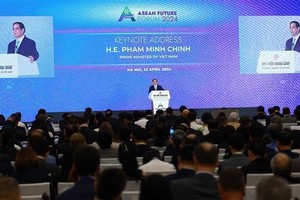Politicians, diplomats and thousands of supporters lined up for hours at a public stadium Sunday in Nepal's capital to pay respect to Girija Prasad Koirala, the former prime minister remembered for leading efforts to bring democracy to the Himalayan nation.
Koirala died Saturday at age 86. His body was taken to the Nepali Congress party headquarters before it arrived at the stadium in Katmandu on a truck covered with flowers and the party's red and white flags.
Prime Minister Madhav Kumar Nepal laid the national flag over the body.
"His contributions and fight for democracy will always be remembered in history. He was the pillar in the battle against autocracy in Nepal," Nepal said.
Ministers, top politicians, officials and diplomats offered bouquets. The supporters numbering thousands lined up for hours to pay their homage.

"I am more sad today than the day I lost my parents. I have always remembered him as a fighter of democracy and he will remain the father of democracy," said Kamala Sharma, 65, who was among those in line.
Koirola had heart and respiratory problems and had been hospitalized several times in recent months. He died at his daughter's home.
Koirola — who served five terms as prime minister — was president of the Nepali Congress party and led the mass street demonstrations in 2006 that forced then-King Gyanendra to give up his authoritarian rule, reinstate parliament and appoint Koirala as caretaker prime minister. Soon after that, Koirala's government stripped Gyanendra of all his powers and command of the army.
Gyanendra was dethroned and the centuries-old monarchy abolished in May 2008. Soon after that Koirala stepped down as prime minister to allow a new coalition government led by former communist rebels to take power.
Koirala was a key figure in the peace process that ended 10 years of communist insurgency with the Maoist rebels giving up their armed revolt and joining mainstream politics.
Koirala spent seven years in prison in the 1960s for fighting for democratic rule. After democracy was introduced in 1990, he became one of the most powerful forces in the country's tumultuous political scene.
In 1991, Koirala became prime minister of the first democratically elected government after a popular revolt ended absolute rule by the king.
Koirala was known as an autocrat on party loyalty who often quashed internal dissent with an iron fist.
His fourth term ended in 2001 with his government beset by the Maoist insurgency, a bribery scandal and recriminations over a palace massacre that wiped out much of the royal family.
His government wasn't implicated in the killings — in which the king, queen and seven other royal family members died, apparently at the hands of the crown prince, who killed himself — but the massacre shocked and dismayed Nepal, and blame for security lapses fell on Koirala.
Koirala's body was scheduled to be cremated later Sunday near Pashupatinath temple in Katmandu.
























